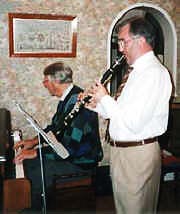THE CLARINET
Background
My first clarinet, a Boosey & Hawkes Regent, was given to me as a 21st birthday present in 1954. I took lessons with a clarinet and saxophone professional for three or four years but after that, marriage, the arrival of children, and other interests and responsibilities, resulted in there being insufficient time (or energy!) to continue the hobby.
Interest was revived for a couple of years in the 1970s when my wife and I became friends with a competent pianist who enjoyed playing duets. At this time I changed the Regent for a second-hand Boosey & Hawkes 1010.
The clarinet was then put away again until I retired in 1991 when I decided I wanted to get more involved in music. The mouthpiece of the 1010 needed a little adjustment so I took it to a specialist repairer. This man happened to know of a clarinet choir which met not very far from where I live, so I enquired and subsequently joined the choir. And from connections there I also joined a Concert Band.
Since that time the clarinet has become a major interest and has given great pleasure (and perhaps a few frustrations!).
I then played regularly for 20 years. I left the Concert Band after four years - during which time the band had played in Amsterdam and a Paris suburb. I have a large family and am only able to see them at week-ends and as the band often gave concerts and played at fetes etc at week-ends something had to give. However I thoroughly recommend instrumentalists to join a local band as there is no substitute for the discipline of playing with a large ensemble.
Similarly the clarinet choir is a great experience. Playing with other clarinettists, under the direction of a conductor, with the full range of clarinets from the little Eb to the bass and contra-bass instruments can be very satisfying. The choir I played in was the Thameside Clarinet Choir and all ages were welcome, though a reasonably good sight reading ability was, and still is, desirable. In 2006 the choir started giving public performances and as these were very successful it was decided to continue them at the rate of two per year.
A number of years ago I invited a friend to my home, on a weekly basis, to play duets. Later another friend was invited and another and another until we became a sextet. We just played for our own amusement - I doubt whether anyone would want to listen to us! - but this weekly meeting was very much a highlight in my life, the satisfaction of making music with a group of friends has to be experienced to be understood. We played mostly classical music, anything from Mozart to Hummel, Schubert, Beethoven and Crusell, many of the pieces being transcriptions from string works. But we also enjoyed the occasional jazz or swing number.
I arranged some works myself, a task made easier - though not easy - by the computer and notation software. I use Capella, a German product, which is good and not as expensive as many other programs of its type. There is also the advantage that there is a companion piece of software, Capella-Scan, which reads and interprets music from a scan. Although errors occur, scanning-in a piece of music is a lot quicker than entering everything by hand.
In 2012 my wife and I decided it was time to move to a smaller property and we subsequently moved to a bungalow near the South Coast. This meant that my membership of the ensemble had to end, which after ten years was sad but once we are settled in our new home I may look for players in the area with a view to starting again!
My current instruments are a Yamaha CSGIIIL and a La Fleur (B&H imported) Eb soprano. Clarinettists are fortunate that top quality instruments are relatively cheap compared with most other orchestral instruments and are therefore within reach of amateurs like myself. For a time I also had a Buffet Prestige Bass instrument, which was a delight to play, but after my house move I decided to sell it.
If you are thinking of buying a clarinet bear in mind that cheap instruments are likely to be more difficult to play than more expensive examples. So buy the best you can afford. Many dealers offer instruments on loan terms, with purchase after a few months if you decide you wish to continue. The best policy is to take the advice of a good teacher.
The mouthpiece is a critical element of the instrument and is the source of its tone. A new mouthpiece can often work wonders on an old but otherwise good instrument. Again, quality is expensive but worth it, buy the best you can afford!

To visit pages explaining the basics of the clarinet click here:
